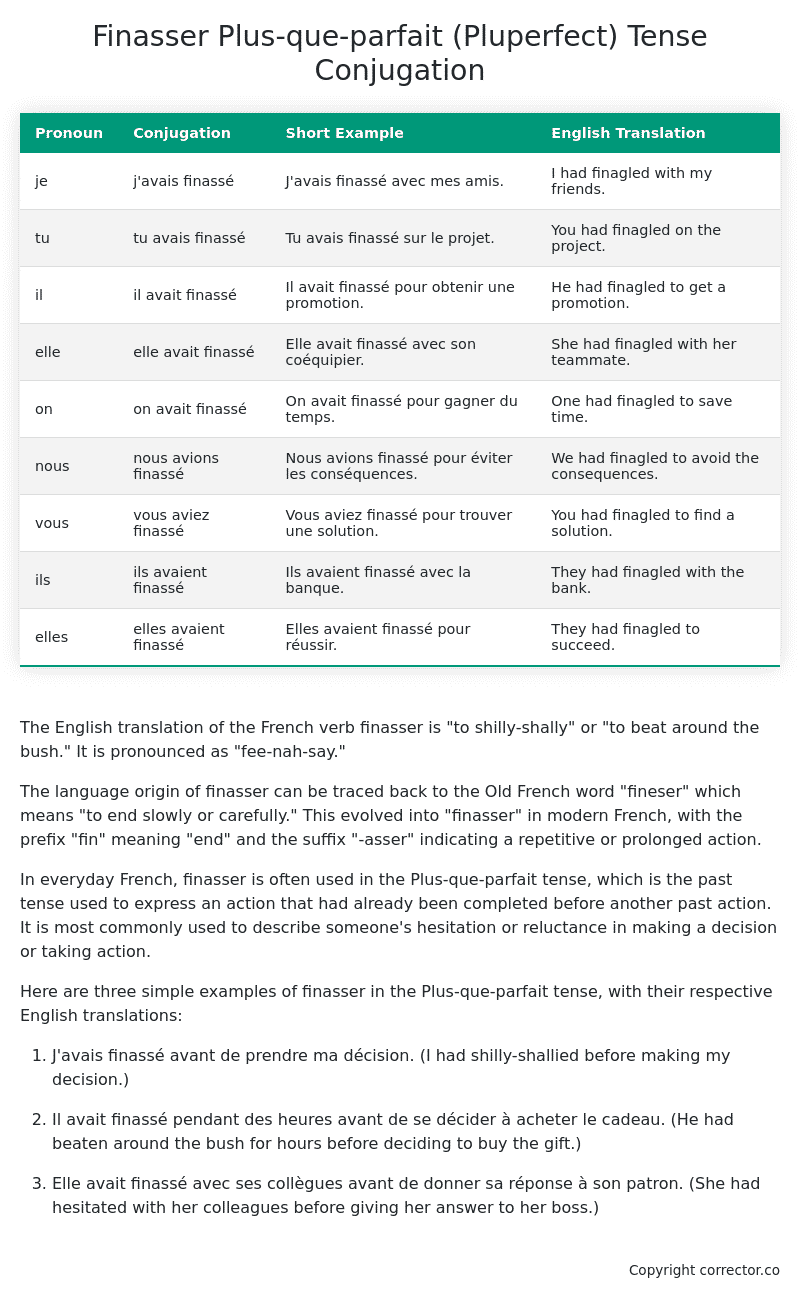Plus-que-parfait (Pluperfect) Tense Conjugation of the French Verb finasser
Introduction to the verb finasser
The English translation of the French verb finasser is “to shilly-shally” or “to beat around the bush.” It is pronounced as “fee-nah-say.”
The language origin of finasser can be traced back to the Old French word “fineser” which means “to end slowly or carefully.” This evolved into “finasser” in modern French, with the prefix “fin” meaning “end” and the suffix “-asser” indicating a repetitive or prolonged action.
In everyday French, finasser is often used in the Plus-que-parfait tense, which is the past tense used to express an action that had already been completed before another past action. It is most commonly used to describe someone’s hesitation or reluctance in making a decision or taking action.
Here are three simple examples of finasser in the Plus-que-parfait tense, with their respective English translations:
-
J’avais finassé avant de prendre ma décision. (I had shilly-shallied before making my decision.)
-
Il avait finassé pendant des heures avant de se décider à acheter le cadeau. (He had beaten around the bush for hours before deciding to buy the gift.)
-
Elle avait finassé avec ses collègues avant de donner sa réponse à son patron. (She had hesitated with her colleagues before giving her answer to her boss.)
Table of the Plus-que-parfait (Pluperfect) Tense Conjugation of finasser
| Pronoun | Conjugation | Short Example | English Translation |
|---|---|---|---|
| je | j’avais finassé | J’avais finassé avec mes amis. | I had finagled with my friends. |
| tu | tu avais finassé | Tu avais finassé sur le projet. | You had finagled on the project. |
| il | il avait finassé | Il avait finassé pour obtenir une promotion. | He had finagled to get a promotion. |
| elle | elle avait finassé | Elle avait finassé avec son coéquipier. | She had finagled with her teammate. |
| on | on avait finassé | On avait finassé pour gagner du temps. | One had finagled to save time. |
| nous | nous avions finassé | Nous avions finassé pour éviter les conséquences. | We had finagled to avoid the consequences. |
| vous | vous aviez finassé | Vous aviez finassé pour trouver une solution. | You had finagled to find a solution. |
| ils | ils avaient finassé | Ils avaient finassé avec la banque. | They had finagled with the bank. |
| elles | elles avaient finassé | Elles avaient finassé pour réussir. | They had finagled to succeed. |
Other Conjugations for Finasser.
Le Present (Present Tense) Conjugation of the French Verb finasser
Imparfait (Imperfect) Tense Conjugation of the French Verb finasser
Passé Simple (Simple Past) Tense Conjugation of the French Verb finasser
Passé Composé (Present Perfect) Tense Conjugation of the French Verb finasser
Futur Simple (Simple Future) Tense Conjugation of the French Verb finasser
Futur Proche (Near Future) Tense Conjugation of the French Verb finasser
Plus-que-parfait (Pluperfect) Tense Conjugation of the French Verb finasser (this article)
Passé Antérieur (Past Anterior) Tense Conjugation of the French Verb finasser
Futur Antérieur (Future Anterior) Tense Conjugation of the French Verb finasser
Subjonctif Présent (Subjunctive Present) Tense Conjugation of the French Verb finasser
Subjonctif Passé (Subjunctive Past) Tense Conjugation of the French Verb finasser
Subjonctif Imparfait (Subjunctive Imperfect) Tense Conjugation of the French Verb finasser
Subjonctif Plus-que-parfait (Subjunctive Pluperfect) Tense Conjugation of the French Verb finasser
Conditionnel Présent (Conditional Present) Tense Conjugation of the French Verb finasser
Conditionnel Passé (Conditional Past) Tense Conjugation of the French Verb finasser
L’impératif Présent (Imperative Present) Tense Conjugation of the French Verb finasser
L’infinitif Présent (Infinitive Present) Tense Conjugation of the French Verb finasser
Struggling with French verbs or the language in general? Why not use our free French Grammar Checker – no registration required!
Get a FREE Download Study Sheet of this Conjugation 🔥
Simply right click the image below, click “save image” and get your free reference for the finasser Plus-que-parfait tense conjugation!

Finasser – About the French Plus-que-parfait (Pluperfect) Tense
Tense Formation
Common everyday usage patterns
Sequencing of past events
Background information
Hypothetical or reported speech
Interactions with other tenses
Summary
I hope you enjoyed this article on the verb finasser. Still in a learning mood? Check out another TOTALLY random French verb conjugation!


